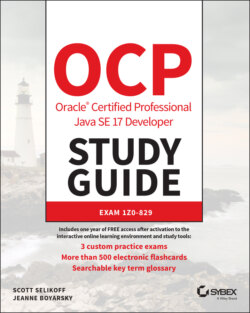Читать книгу OCP Oracle Certified Professional Java SE 17 Developer Study Guide - Jeanne Boyarsky - Страница 119
Applying Scope to Classes
ОглавлениеAll of that was for local variables. Luckily, the rule for instance variables is easier: they are available as soon as they are defined and last for the entire lifetime of the object itself. The rule for class, aka static, variables is even easier: they go into scope when declared like the other variable types. However, they stay in scope for the entire life of the program.
Let's do one more example to make sure you have a handle on this. Again, try to figure out the type of the four variables and when they go into and out of scope.
1: public class Mouse { 2: final static int MAX_LENGTH = 5; 3: int length; 4: public void grow(int inches) { 5: if (length < MAX_LENGTH) { 6: int newSize = length + inches; 7: length = newSize; 8: } 9: } 10: }
In this class, we have one class variable, MAX_LENGTH; one instance variable, length; and two local variables, inches and newSize. The MAX_LENGTH variable is a class variable because it has the static keyword in its declaration. In this case, MAX_LENGTH goes into scope on line 2 where it is declared. It stays in scope until the program ends.
Next, length goes into scope on line 3 where it is declared. It stays in scope as long as this Mouse object exists. inches goes into scope where it is declared on line 4. It goes out of scope at the end of the method on line 9. newSize goes into scope where it is declared on line 6. Since it is defined inside the if statement block, it goes out of scope when that block ends on line 8.
